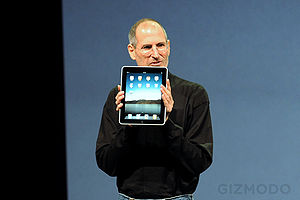 Image via Wikipedia
Image via WikipediaOn the side of digital media we have Saul Griffith, who says that when you take into account the energy used to produce all of the books, magazines and newspapers that we have in our lives, ship them to the stores, light and air-condition the stores, and then drive them home, it is more than the amount of energy used by an electronic device that can replace all of them (iPad, Kindle, or laptop). I have to wonder, however, if this reckoning takes into account the fact that many tech savvy readers upgrade their electronic devices as fast as Steve Jobs and Jeff Bezos can come out with new models. Sure, if the iPad replaced every book and magazine in my life, it would balance out great. But what if it only replaces one year's worth of my print media, and then I upgrade?
 Image via Wikipedia
Image via Wikipediabooks. A single paperback can be read by dozens, or theoretically hundreds of people. Periodicals are more disposable by nature, but anyone who has frequented a cafe alone knows that a paper too can have multiple readers. Would this multiple readership divide the energy consumed by the number of readers? Public Libraries and websites like Paperback Swap add to this effect, and some people (like myself) have many books but never buy any of them new. Does that commitment change the equation? Most importantly, if you combine all of these points, is the balance still in favor of the digital age?
All of this would argue for print media, but to be balanced myself, I have to point out that digital does have a lot going for it as well. I opened this discussion by stating that the free flow of information is one of the most important parts of a sustainable society, because the rapid and free transfer of information promotes understanding of the issues and methods of a sustainable life. In this regard, digital media has print beat hands down. If someone has a simple idea for reducing energy consumption in a home or office, and they write in to their local paper, only the local audience will get that information. If that tip is very climate or region specific that might be just fine, but if it is widely applicable then isn't it better for that piece of information to be online where anyone in the world can access it?
In the end, the best thing that you can do is keep track of and think about how you use the media in your life. If you go with print: get books used, borrow from libraries and friends, only subscribe to the magazines and papers that you really care about, and when you are hungry for more use the library to access the digital version of media you are not 100% on. If you go the digital route, make a concerted effort to reduce the amount of media that you buy in the print format. Which ever route you choose to take, avoid frequent upgrades to the latest eReader hardware (especially if you already have a laptop, desktop, etc.), try to get more books used or borrow them from libraries, and cancel your subscription to magazines that you only read one or two articles out of each issue. If you follow these simple suggestions you should end up spending less on your media as well, and as always my favorite kind of green is the kind in my wallet.

No comments:
Post a Comment